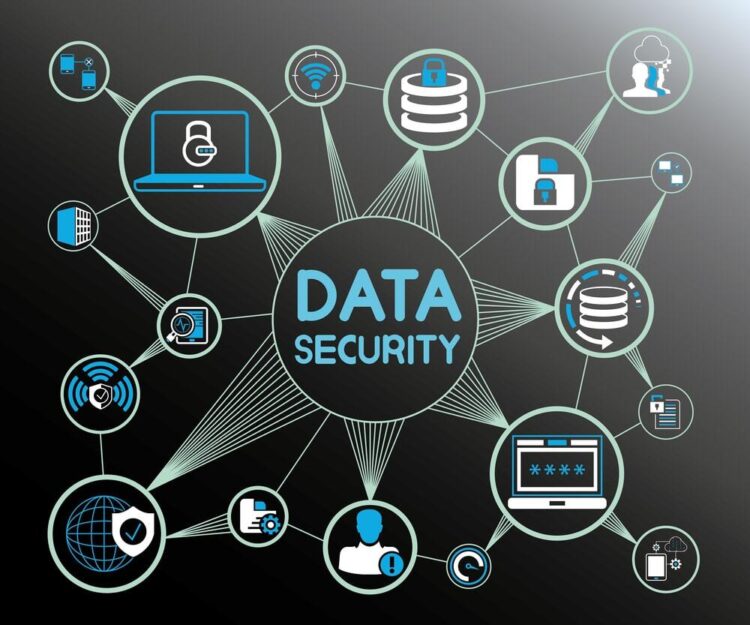Significant societal changes have occurred since the last major data leak. Data security is vital not just for you but also for the company to whom you have entrusted it. The loss or theft of our devices would be devastating because of the sensitive personal and professional data they contain. That’s why it’s vital that we treat data security seriously and conduct frequent checks to identify and close any potential vulnerabilities that may cause harm.
The complexity of data security stems from the wide range of issues that must be considered. However, learning how they interact as a whole is essential. This article will further dive into data security.
Page Contents
Understanding Data Security

Source: smartdatacollective.com
Data security is the safeguarding of information against sabotage, loss, alteration, or viewing by unauthorized parties. Numerous factors contribute to the safety of one’s data. Data security measures are put in place to ensure that only authorized users can access sensitive information.
When providing information to a business, it’s important to take precautions to ensure that your data doesn’t end up in the hands of employees or hackers. You may not give importance to it, but reading data policies is essential because they state how your information will be used. If confidential information were to slip into the wrong hands, it could seriously damage the company’s brand and customer trust.
Data Security Types You Must Know About
The protection of sensitive information is an essential part of any modern business’s IT system. Data security has its own foundational principles, much like any other area of IT. The main types of data security are encryption, data masking, data resiliency, and data erasure.
Encryption

Source: itprotoday.com
The protection of sensitive information relies heavily on encryption. No one can decode your information unless authorized due to encryption. With this, you can rest easy knowing that if your information falls into the wrong hands, they won’t be able to use it to blackmail you since they don’t have the key to decrypt the code.
Data, such as user data that leaves one application and enters another, is encrypted before it leaves the first. All of your encrypted data would be vulnerable if this key fell into the wrong hands. The severe implications that could result from hackers gaining access to important data make it imperative for firms that possess such keys to maintain strong security.
Data Masking
Data masking is a method of concealing private data in a database. It is a technique for restricting access to private information to only those who need it. This method utilizes a set of rules or formulas to conceal data from view within a database. Data can be encrypted by substituting its true values with random numbers, characters, or sequences. The method serves to conceal or obfuscate sensitive information from prying eyes.
There are three stages to data masking:
- Making disguised information by substituting surrogate keys for sensitive columns;
- Using a key to restrict access to the original dataset so that only those with permission can view it;
- Whenever the original dataset is available, it is replaced with the masked one.
Data Resiliency

Source: univdatos.com
The fallout from a data breach can be significant, resulting in lost time and money, among other issues. The ability to recover from data loss or corruption, known as data resiliency, is critical to mitigating these risks.
Data resiliency is a subset of data security that aids businesses in recovering quickly from data loss due caused by hackers, hardware failure, natural disasters, and human error. It involves creating backup copies of data so that if one copy gets corrupted or lost, there’s another copy stored somewhere else in case something goes wrong with the original file or storage device.
With the aid of online or offline methods for backing up your network and any sensitive data, your company can achieve data resilience in a variety of ways today. By having a resilient system, you won’t worry about doing manual labor all the time because it can be designed to do necessary tasks when faced with possible threats.
Data Erasure
Erasing data means permanently removing data from a computer or other storage device. Clearing equipment and software are two examples of hardware options for doing this manually. Wiping a system clean of all data before a crisis occurs is crucial to preventing confidential data from getting into the hands of unauthorized people. The area occupied by the discarded data is not truly erased but rather made available for overwriting. You can erase information in two ways: physically and virtually.
Benefits of Having Strong Data Security

Source: smartdatacollective.com
When an organization takes precautions to ensure the safety of the data it stores and transmits, it practices data security. Everything from private correspondence to proprietary financial data to trade secrets falls into this category. Your data’s safety is vital to the success of your company. Some benefits of having strong data security may include the following:
Protection Against Cyberattacks
Data security is the first line of defense against hackers that target businesses in search of sensitive information. When you have good and strong data security, you won’t be concerned about any attacks because you have a strong defense that will make it hard or even impossible for cyber criminals to breach. It is important to note that having good data security is a must to prevent any unwanted fines or lawsuits.
Keeping Confidential Information Safe
Customer’s personal information, including credit card numbers, is protected from being stolen, lost, misused, or accessed without permission thanks to data security measures. This is crucial if your business handles private customer data or conducts financial transactions over the Internet.
If you take the time to secure your company’s data properly, you can ensure that your customers will be satisfied and at ease knowing that their valuable information is well taken care of. This will likely increase their trust in you and your company over time.
Conclusion
If you run a business that relies on clients providing their personal information, protecting that data should be your primary responsibility. With strong data security, you can assure your customers that they won’t have a problem sharing their personal information with your company because you prioritize its protection. Aside from that, you may face legal issues if you fail to safeguard the information entrusted to your company.





